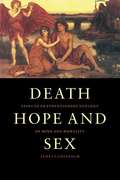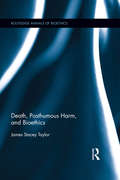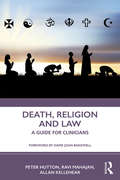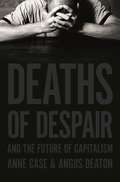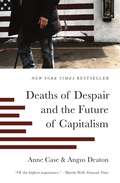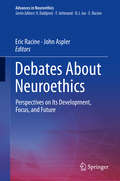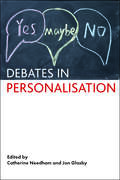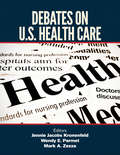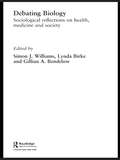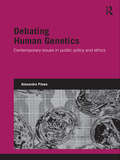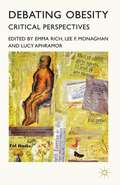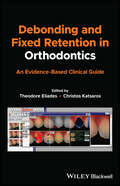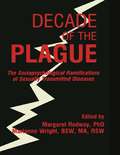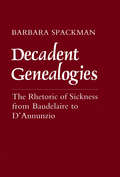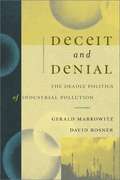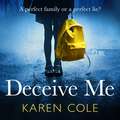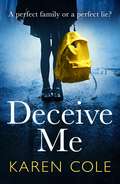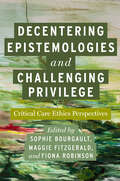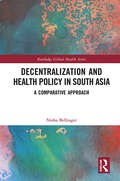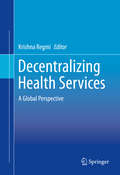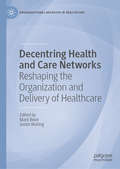- Table View
- List View
Death, Hope And Sex: Steps To An Evolutionary Ecology Of Mind And Morality
by James S. ChisholmBy showing how and why human nature is what it is, evolutionary theory can help us see better what we need to do to improve the human condition. Following evolutionary theory to its logical conclusion, Death, Hope and Sex uses life history theory and attachment theory to construct a model of human nature in which critical features are understood in terms of the development of alternative reproductive strategies contingent on environmental risk and uncertainty. James Chisholm examines the implications of this model for perspectives on concerns associated with human reproduction, including teen pregnancy, and young male violence. He thus develops new approaches for thorny issues such as the nature-nurture and mind-body dichotomies. Bridging the gap between the social and biological sciences, this far-reaching volume will be a source of inspiration, debate and discussion for all those interested in the evolution of human nature and the potential for an evolutionary humanism.
Death, Posthumous Harm, and Bioethics: Death, Posthumous Harm, And Bioethics (Routledge Annals of Bioethics #12)
by James Stacey TaylorDeath, Posthumous Harm, and Bioethics offers a highly distinctive and original approach to the metaphysics of death and applies this approach to contemporary debates in bioethics that address end-of-life and post-mortem issues. Taylor defends the controversial Epicurean view that death is not a harm to the person who dies and the neo-Epicurean thesis that persons cannot be affected by events that occur after their deaths, and hence that posthumous harms (and benefits) are impossible. He then extends this argument by asserting that the dead cannot be wronged, finally presenting a defence of revisionary views concerning posthumous organ procurement.
Death, Religion and Law: A Guide For Clinicians
by Allan Kellehear Peter Hutton Ravi MahajanThis practical guide summarizes the principles of working with dying patients and their families as influenced by the commoner world religions and secular philosophies. It also outlines the main legal requirements to be followed by those who care for the dying following the death of the patient. The first part of the book provides a reflective introduction to the general influences of world religions on matters to do with dying, death and grief. It considers the sometimes conflicting relationships between ethics, religion, culture and personal philosophies and how these differences impact on individual cases of dying, death and loss. The second part describes the general customs and beliefs of the major religions that are encountered in hospitals, hospices, care homes and home care settings. It also includes discussion of non-religious spirituality, humanism, agnosticism and atheism. The final part outlines key socio-legal aspects of death across the UK. Death, Religion and Law provides key knowledge, discussion and reflection for dealing with the diversity of the everyday care of dying and death in different religious, secular and cultural contexts. It is an important reference for practitioners working with dying patients, their families and the bereaved.
Deaths of Despair and the Future of Capitalism
by Angus Deaton Anne CaseFrom economist Anne Case and Nobel Prize winner Angus Deaton, a groundbreaking account of how the flaws in capitalism are fatal for America's working classLife expectancy in the United States has recently fallen for three years in a row—a reversal not seen since 1918 or in any other wealthy nation in modern times. In the past two decades, deaths of despair from suicide, drug overdose, and alcoholism have risen dramatically, and now claim hundreds of thousands of American lives each year—and they're still rising. Anne Case and Angus Deaton, known for first sounding the alarm about deaths of despair, explain the overwhelming surge in these deaths and shed light on the social and economic forces that are making life harder for the working class. They demonstrate why, for those who used to prosper in America, capitalism is no longer delivering.Deaths of Despair and the Future of Capitalism paints a troubling portrait of the American dream in decline. For the white working class, today's America has become a land of broken families and few prospects. As the college educated become healthier and wealthier, adults without a degree are literally dying from pain and despair. In this critically important book, Case and Deaton tie the crisis to the weakening position of labor, the growing power of corporations, and, above all, to a rapacious health-care sector that redistributes working-class wages into the pockets of the wealthy. Capitalism, which over two centuries lifted countless people out of poverty, is now destroying the lives of blue-collar America.This book charts a way forward, providing solutions that can rein in capitalism’s excesses and make it work for everyone.
Deaths of Despair and the Future of Capitalism
by Angus Deaton Anne CaseA New York Times BestsellerA Wall Street Journal BestsellerA New York Times Notable Book of 2020A New York Times Book Review Editors’ ChoiceShortlisted for the Financial Times and McKinsey Business Book of the YearA New Statesman Book to ReadFrom economist Anne Case and Nobel Prize winner Angus Deaton, a groundbreaking account of how the flaws in capitalism are fatal for America's working classDeaths of despair from suicide, drug overdose, and alcoholism are rising dramatically in the United States, claiming hundreds of thousands of American lives. Anne Case and Angus Deaton explain the overwhelming surge in these deaths and shed light on the social and economic forces that are making life harder for the working class. As the college educated become healthier and wealthier, adults without a degree are literally dying from pain and despair. Case and Deaton tie the crisis to the weakening position of labor, the growing power of corporations, and a rapacious health-care sector that redistributes working-class wages into the pockets of the wealthy. This critically important book paints a troubling portrait of the American dream in decline, and provides solutions that can rein in capitalism's excesses and make it work for everyone.
Debates About Neuroethics
by Eric Racine John AsplerThis is the first book entirely dedicated to exploring issues associated with the nature of neuroethics. It reflects on some of the underlying assumptions in neuroethics, and the implications of those assumptions with respect to training and education programs, research activities, policy engagement, public discourse, teaching, ethics consultation and mentoring, to name but a few areas of interest. Internationally respected and emerging leaders in the area have taken up the pen to express and debate their views about the development, focus and future of neuroethics. They share their analyses and make recommendations regarding how neuroscience could more effectively explore and tackle its philosophical, ethical, and societal implications.
Debates in Personalisation
by Catherine Needham and Jon GlasbyThis unique book brings together, for the first time, advocates and critics of the personalisation agenda in English social care services to debate key issues relating to personalisation. Perspectives from service users, practitioners, academics and policy commentators come together to give an account of the practicalities and controversies associated with the implementation of personalised approaches. The conclusion examines how to make sense of the divergent accounts presented, asking if there is a value-based approach to person-centred care that all sides share. Written in a lively and accessible way, practitioners, students, policy makers and academics in health and social care, social work, public policy and social policy will appreciate the interplay of rival arguments and the way that ambiguities in the care debate play out as policy ideas take programmatic form.
Debates in Values-Based Practice: Arguments For and Against
by Michael LoughlinDemands on healthcare systems are increasingly complex and diverse. Consumerism, multiculturalism and regulation challenge practitioners and policymakers. This has led to urgent debate about the value and purpose of healthcare as people seek to make serious, well-thought through decisions. This book helps readers to make rational decisions about healthcare provision in the context of complex and diverse values. It offers no easy solutions, instead presenting a range of perspectives and arguments on values-based practice, an increasingly influential approach to managing value-conflicts/differences in medicine, psychiatry, health and social care. Readers must make their own minds up about the controversies, but this book will give them a sense of the scene and the ability to defend their own position with clarity and confidence. This is a valuable resource for health practitioners and managers, academics in health services research and policy and students of management, bioethics, applied philosophy and political and social theory.
Debates on U.S. Health Care
by Wendy E. Parmet Jennie Kronenfeld Mark A. ZezzaThis issues-based reference work (available in both print and electronic formats) shines a spotlight on health care policy and practice in the United States. Impassioned debates about the best solutions to health care in America have perennially erupted among politicians, scholars of public policy, medical professionals, and the general public. The fight over the Health Care Reform Act of 2010 brought to light a multitude of fears, challenges, obstacles, and passions that often had the effect of complicating rather than clarifying the debate. The discourse has never been more heated. The complex issues that animate the health care debate have forced the American public to grapple with the exigencies of the present system with regard to economic, fiscal, and monetary policy, especially as they relate to philosophical, often ideologically driven approaches to the problem. Americans have also had to examine their ideas about the relationship of the individual to and interaction with the state and the varied social and cultural beliefs about what an American solution to the problem of health care looks like. In light of the need to keep students, researchers, and other interested readers informed and up-to-date on the issues surrounding health care in the U.S., this volume uses introductory essays followed by point/counterpoint articles to explore prominent and perennially important debates, providing readers with views on multiple sides of this complex issue.Features & Benefits:The volume is divided into three sections, each with its own Section Editor: Quality of Care Debates (Dr. Jennie Kronenfeld), Economic & Fiscal Debates (Dr. Mark Zezza), and Political, Philosophical, & Legal Debates (Prof. Wendy Parmet). Sections open with a Preface by the Section Editor to introduce the broad theme at hand and provide historical underpinnings.Each Section holds 12 chapters addressing varied aspects of the broad theme of the section.Chapters open with an objective, lead-in piece (or "headnote") followed by a point article and a counterpoint article.All pieces (headnote, point article, counterpoint article) are signed.For each chapter, students are referred to further readings, data sources, and other resources as a jumping-off spot for further research and more in-depth exploration.Finally, the volume concludes with a comprehensive index, and the electronic version of the book includes search-and-browse features, as well as the ability to link to further readings cited within chapters should they be available to the library in electronic format.
Debating Biology
by Simon J. Williams Gillian A. Bendelow Lynda BirkeRelations between the biological and social sciences have been hotly contested and debated over the years. The uses and abuses of biology, not least to legitimate or naturalize social inequalities and to limit freedoms, have rightly been condemned. All too often, however the style of debate has been reductionist and ultimately unfruitful. As we enter an age in which ultr-Darwinian forms of explanation gather momentum and the bio-tech revolution threatens a 'Brave New World' of possibilities, there is urgent need to re-open the dialogue and rethink these issues in more productive ways. Debating Biology takes a fresh look at the relationship between biology and society as it is played out in the arena of health and medicine. Bringing together contributions from both biologists and sociologists, the book is divided into five themed sections:- Theorising Biology draws on a range of critical perspectives to discuss the case or 'bringing back' the biological into sociology.- Structuring Biology focuses on the interplay between biological and social factors in the 'patterning' of health and illness.- Embodying Biology examines the relationship between the lived body and the biological body- Technologizing Biology takes up the multiple relations between biology, science and technology.- Reclaiming Biology looks at the broader ethical and political agendas.Written in an accessible and engaging style, this timely volume will appeal to a wide audience within and beyond the social sciences, including students, lecturers and researchers in health and related domains.
Debating Human Genetics: Contemporary Issues in Public Policy and Ethics (Genetics and Society)
by Alexandra PlowsDebating Human Genetics is based on ethnographic research focusing primarily on the UK publics who are debating and engaging with human genetics, and related bio and techno-science. Drawing on recent interviews and data, collated in a range of public settings, it provides a unique overview of multiple publics as they ‘frame’ the stake of the debates in this emerging, complex and controversial arena. The book outlines key sites and applications of human genetics that have sparked public interest, such as biobanks, stem cells, genetic screening and genomics. It also addresses the ‘scientific contoversies’ that have made considerable impact in the public sphere – the UK police DNA database, gene patenting, ‘saviour siblings’, and human cloning. By grounding the concepts and issues of human genetics in the real life narratives and actions of patient groups, genetic watchdogs, scientists, policy makers, and many other public groups, the book exemplifies how human genetics is a site where public knowledge and value claims converge and collide, and identifies the emergence of ‘hybrid publics’ who are engaging with this hybrid science.
Debating Obesity
by Lucy Aphramor Emma Rich Lee F. MonaghanThis book brings together critical perspectives on some of the recent claims associated with the obesity crisis. It develops both theoretical and conceptual arguments around the obesity debate, as well as taking a more practical focus in terms of implications for the health professions to outline an agenda for a 'critical weight studies'.
Debonding and Fixed Retention in Orthodontics: An Evidence-Based Clinical Guide
by Theodore Eliades Christos KatsarosDebonding and Fixed Retention in Orthodontics An accessible and thorough guide to debonding and fixed retainer bonding Debonding and Fixed Retention in Orthodontics: An Evidence-Based Clinical Guide reviews the protocols, materials, and techniques required at two key stages of orthodontic treatment. The book has been written as a reference guide and the chapters introduce the best-supported and most efficient approaches to each stage of debonding and fixed retainer bonding treatments, from choice of material through to final results. The book includes relevant procedures including orthodontic appliance removal, appliance debonding, the use of rotating instruments, and enamel cleaning. The authors also provide guidance on topics such as the failure and adverse effects of fixed retainers, enamel structural defects, periodontal effects, and aerosol production, to aid in positive result retention. Readers will also find: Two extensive sections covering debonding and fixed retainer bonding Evidence-based guidelines for each stage of treatment Summaries of the side effects of procedures on hard and soft dental tissues Tips to avoid potential unfavorable sequelae Detailed lists of existing methods and their clinical implications Debonding and Fixed Retention in Orthodontics is written for orthodontic specialists, clinicians, and postgraduate dental students looking to build knowledge and ensure the best results during these two stages of orthodontic therapy.
Decade of the Plague: The Sociopsychological Ramifications of Sexually Transmitted Diseases
by Margaret R Rodway Marianne WrightSocial workers, counselors, and health care professionals will be challenged by this thorough presentation of Sexually Transmitted Diseases (STDs). The contributing authors contend that in the immediate future, education, not medicine will be the single most important weapon in stemming the spread of STDs. Thus, the responsibility of educating society and providing service for people who are directly or indirectly affected by STDs lies with helping professions. The devastating social, medical, and psychological aspects of AIDS, herpes, and other STDs are discussed. Contributors focus on the issues involved with counseling individuals with STDs--and their partners, families, and friends--and make suggestions for the education and teaching of professionals and the general public about STDs.
Decadent Genealogies: The Rhetoric of Sickness from Baudelaire to D'Annunzio
by Barbara SpackmanBarbara Spackman here examines the ways in which decadent writers adopted the language of physiological illness and alteration as a figure for psychic otherness. By means of an ideological and rhetorical analysis of scientific as well as literary texts, she shows how the rhetoric of sickness provided the male decadent writer with an alibi for the occupation and appropriation of the female body.
Deceit and Denial: The Deadly Politics of Industrial Pollution
by Gerald E. Markowitz David RosnerThis book reveals the public relations campaign to convince Americans to use its deadly product to paint walls, toys, furniture, and other objects in America's homes, despite a wealth of information that children were at risk for serious brain damage and death from ingesting this poison. This book highlights the immediate dangers ordinary citizens face because of the relentless failure of industrial polluters to warn, inform, and protect their workers and neighbors.
Deceive Me: An addictive psychological thriller with a breathtaking ending!
by Karen ColeA PERFECT FAMILY OR A PERFECT LIE?When Jo's teenage daughter goes missing, she feels like the world is collapsing around her. Has Grace been taken or have recent tensions between mother and daughter driven her away? With little urgency from the police who have dismissed Grace as a teenage runaway who will soon return home, Jo takes matters into her own hands. But as she gets closer to discovering what has happened to Grace, it looks like the Jo's deepest, darkest secret is about to be uncovered, and it could destroy everything she holds dear.A gripping thriller for fans of Louise Jensen, Rachel Abbott and CL Taylor.(P)2019 Quercus Editions Limited
Deceive Me: The addictive psychological thriller with the most breathtaking ending of 2020!
by Karen ColeYOUR DAUGHTER IS MISSING. HOW FAR WOULD YOU GO TO FIND HER?'The ending was nothing short of brilliant!' Amazon reviewer'An ending that left me gasping' Amazon reviewer'An explosive ending' Amazon reviewer'The end left me with my jaw on the floor' Amazon reviewer**********When Jo's teenage daughter goes missing, she feels like the world is collapsing around her. The police believe Grace is just an angry teenager, punishing her parents by hiding out at a friend's house, but Jo is terrified that her daughter is in grave danger. With so little urgency from the police, Jo decides to take matters into her own hands.But, as Jo gets closer to discovering what has happened to her daughter, a devastating secret is uncovered that threatens to destroy the family she has been trying so very hard to protect... **********An addictive psychological thriller, perfect for fans of Rachel Abbott's And So It Begins, Claire McGowan's What You Did and Erin Kinsley's Found.
Deceive Me: The addictive psychological thriller with the most breathtaking ending of 2020!
by Karen ColeYOUR DAUGHTER IS MISSING. HOW FAR WOULD YOU GO TO FIND HER?'The ending was nothing short of brilliant!' Amazon reviewer'An ending that left me gasping' Amazon reviewer'An explosive ending' Amazon reviewer'The end left me with my jaw on the floor' Amazon reviewer**********When Jo's teenage daughter goes missing, she feels like the world is collapsing around her. The police believe Grace is just an angry teenager, punishing her parents by hiding out at a friend's house, but Jo is terrified that her daughter is in grave danger. With so little urgency from the police, Jo decides to take matters into her own hands.But, as Jo gets closer to discovering what has happened to her daughter, a devastating secret is uncovered that threatens to destroy the family she has been trying so very hard to protect... **********An addictive psychological thriller, perfect for fans of Rachel Abbott's And So It Begins, Claire McGowan's What You Did and Erin Kinsley's Found.
Decellularization Methods of Tissue and Whole Organ in Tissue Engineering (Advances in Experimental Medicine and Biology #1345)
by Abdol-Mohammad KajbafzadehThis contributed volume is the first of a series that introduces safe, feasible, and practical decellularization and recellularization techniques for tissue and organ reconstruction. We have put special emphasis on the research areas most likely to develop well-engineered scaffolds for tissue and organ engineering, while presenting easily applicable bench-to-bedside approaches highlighting the latest technical innovations in the field.This book includes both a fundamental discussion for a broad understanding of the basis of tissue repair and substitution, as well as chapters written by world renowned specialists from 20 countries providing deeper discussions and analysis of related sub disciplines.Within these pages, the reader will find state-of-the-art protocols and current clinical challenges in cell and tissue biology, including accurate and comprehensive information on extracellular matrices, natural biomaterials, tissue dynamics, morphogenesis, stem cells, cellular fate progressions, cell and tissue properties for in-vitro and in-vivo applications.This comprehensive and carefully organized treatise provides a clear framework for graduate students and postdoctoral researchers new to the field, but also for researchers and practitioners looking to expand their knowledge on tissue and organ reconstruction.
Decellularized Materials: Preparations and Biomedical Applications
by Xiaoming Li Huiqi XieThis book will consist of 8 chapters, in which important issues regarding decellularized materials (DMs) will be discussed. This book will provide special knowledge of materials for the persons with biomedical background, and special biomedical knowledge for the persons with the background of materials, which will hopefully become a valuable informative read for the researchers and students of biomedical engineering major.
Decentering Epistemologies and Challenging Privilege: Critical Care Ethics Perspectives (Carework in a Changing World)
by Andrea Doucet Sophie Bourgault Vivienne Bozalek Vrinda Dalmiya Maggie FitzGerald Christopher Paul Harris Christine Koggel Marie Garrau Riikka Prattes Eva Jewell Vanessa Watts Emilie Dionne Masaya Llavaneras Blanco Alistair Niemeijer Merel VisseCare ethics first emerged as an attempt to decenter ethics; feminist scholars like Carol Gilligan argued that women’s moral experiences were not reflected in the dominant, masculinist approaches to ethics, which were centered on a rational, disembodied, atomistic moral subject. Care ethics challenged this model by positing ethics as relational, contextualized, embodied, and realized through practices rather than principles. Over the past decades, many care ethics scholars have sought to further this project by considering care politically and epistemologically, in relation to various intersecting hierarchies of power and knowledge. This book advances this project by discussing the ways care ethics contributes to the decentering of dominant epistemologies and to the challenging of privilege and by considering how to decenter care ethics itself via an encounter with non-Western philosophical traditions and alternative epistemologies. Written by scholars from different countries, disciplines, and intellectual traditions, the volume offers original care ethics contributions on epistemic injustice, privileged irresponsibility, ecofeminism, settler colonialism, social movements such as BLM, and various racialized and gendered inequities tied to care work.
Decentralization and Health Policy in South Asia: A Comparative Approach (Routledge Global Health Series)
by Nisha BellingerThis ambitious and insightful book provides a unique regional perspective on health policy across South Asia, focusing on how the decentralization of policy and governance leads to differing health outcomes across different countries in the region.Comparing the contexts and outcomes in Sri Lanka, Pakistan, India, Nepal, and Bangladesh, the book asks how power sharing arrangements between central and subnational layers of government nevertheless result in varying levels of success across issues such as infant and under-five mortality rates. The book argues that it is the role of central government in formulating policy, and how this feeds into regional implementation, that partly explains the disparities in health outcomes across the region.The book will interest students and scholars of South Asia politics, global health and health policy more generally.
Decentralizing Health Services
by Krishna RegmiDecentralizing Health Services A Global Perspective Krishna Regmi, editor Current economic, demographic, and environmental shifts are presenting major challenges to health care systems around the world. In response, decentralization--the transfer of control from central to local authorities--is emerging as a successful means of meeting these challenges and reducing inequities of care. But as with health care itself, one size does not fit all, and care systems must be responsive to global reality as well as local demand. Decentralizing Health Services explores a variety of applications of decentralization to health care delivery in both the developing and developed worlds. Outfitted with principles, blueprints, and examples, this ambitious text clearly sets out the potential role of decentralized care as a major player in public health. Its models of service delivery illustrate care that is effective, inclusive, flexible, and in tune with the current era of preventive and evidence-based healthcare . Contributors point out opportunities, caveats, and controversies as they: Clarify the relationships among decentralization, politics, and policy Differentiate between political, fiscal, and administrative decentralization in health care systems Consider public/private partnerships in health systems Explain how the effects of decentralization can be evaluated. Present the newest data on the health outcomes of decentralization Explore some challenges and global issues of health systems in the 21st century And each chapter features learning goals, discussion questions, activities, and recommendations for further reading Heralding changes poised to revolutionize care, Decentralizing Health Services will broaden the horizons of researchers and administrators in health services, health economics, and health policy
Decentring Health and Care Networks: Reshaping the Organization and Delivery of Healthcare (Organizational Behaviour in Healthcare)
by Mark Bevir Justin WaringNetworks have become a prominent template for public service governance. Often seen as an alternative to hierarchies and contracts, networks cross institutionalized organizational or sectoral boundaries to promote collaboration and the sharing of resources when addressing complex problems. Nowhere is this more the case than in the field of health services modernization and improvement. Comprising unique empirical contributions, drawn primarily from the experience of the UK National Health Service (NHS), this edited collection develops a ‘decentred’ analysis of health and care networks. Contributors look beyond particular structures or patterns of governance and focus instead on the interpretation of the meaningful practices of policy actors as they encounter and enact policy instruments and structures. The approach offers a distinct form of analysis that deepens and enriches more traditional public policy accounts of network governance. It recognizes the influence of local history, highlights the influence of dominant economic, technical and corporate narratives, and acknowledges the continued influence of biomedical knowledge and professional expertise. Offering practical insight for current and future service leaders about the challenges of implementing, managing and working within networks, this book draws out key messages for practitioners and researchers alike.
